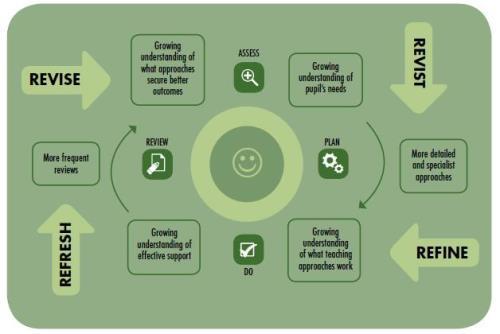2. What are 'SEND Support' and the 'Graduated Approach'?
In the new SEND Code of Practice (2014) the categories of ‘School Action’ and ‘School Action Plus’ have been replaced by a single category of SEND called ‘SEND Support’. This means that where a pupil is identified as having SEND, the school should take action to remove barriers to the child’s learning and put effective special educational provision in place in order to enable the pupil to participate, learn and make progress.
SEND Support
SEND support arises from a four-part cycle through which earlier decisions and actions are revisited, refined and revised with a growing understanding of the pupil’s needs and of what supports the pupil in making good progress and securing good outcomes. The four stages of the cycle are:
- Assess
- Plan
- Do
- Review
This is known as the graduated approach. Teachers are continually assessing, planning, implementing and reviewing their approach to teaching all children. However, where a potential special educational need has been identified, this cyclical process becomes increasingly personalised as it progressively draws on approaches that are more detailed, more frequent review and more specialist expertise in successive cycles in order to tailor intervention and support to the individual needs of our SEND pupils.
The graduated approach is revisited in increasing detail and with increasing frequency in order to identify the best way of securing good progress for the pupil. If, after applying the graduated approach, the child makes good progress and no longer requires the need for additional or different resources, the child is then removed from ‘SEND support’ following consultation with parents/carers.
The Graduated Approach

